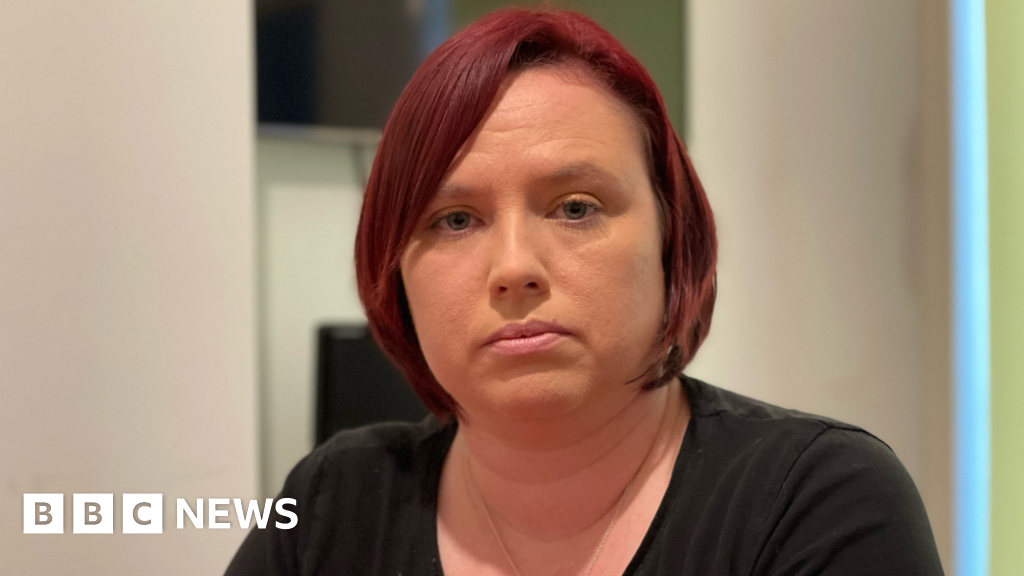- By Paul Moseley and Zoe Applegate
- BBC Norwich
Image source, Shaun Whitmore/BBC
Sandy Simmons will have spent more than 18 months on a waiting list for an urgent hysterectomy after suffering a frightening uterine prolapse almost three years ago
A mother-of-four facing an 18 month wait for a hysterectomy says the pain has left her in “survival mode”.
Sandy Simmons, from Great Yarmouth, had a uterine prolapse in 2021 and was told 11 months ago that she needed surgery, which is due to take place this summer.
The NHS in Norfolk said it was “very sorry” and that it was “working hard to reduce waits”.
Ms Simmons said she was rushed to hospital in March 2021 after several days of bleeding.
The 39-year-old’s uterus prolapsed leaving her in “horrendous pain”.
“Having four kids, you think you know your body, but this scared me so badly that I didn’t know what was going to happen,” she said.
“It’s progressed quite badly – I’ve now developed a bladder and bowel prolapse; my vaginal walls have collapsed.
“I’m in constant pain… and the stuff you can’t do like heavy lifting, sneezing, coughing – these simple things, really get you down.”
Image source, PA/Jeremy Durkin
More than 900 women were waiting more than a year for gynaecological treatment at the Norfolk and Norwich University Hospital
Ms Simmons said she was told that even though she was an “urgent” case, her operation was delayed as a result of Covid and the NHS strikes.
She was told by clinicians to go to casualty if her health took a sudden downturn.
“I’m so frustrated – I don’t know what the hospitals are doing to solve this issue,” she added.
A spokesperson for the NHS in Norfolk and Waveney said in a statement: “We are very sorry to anyone waiting longer than expected for investigations and treatment.
“We continually review our waiting lists and we are prioritising cancer, the most urgent and longest-waiting patients.
“Our teams are working hard to reduce waits by carrying out additional theatre lists and clinics at evenings and weekends.”
According to the most recent NHS England figures, there were 905 women waiting more than a year for gynaecological treatment at the Norfolk and Norwich University Hospital where Ms Simmons was being treated.
At the James Paget University Hospital in Gorleston, 448 patients had been waiting over a year, with a further 89 at the Queen Elizabeth Hospital in King’s Lynn.
The target meant the James Paget was the second worst performing hospital in England for gynaecological services, with 37.6% of patients completing treatment within 18 weeks.
‘Geographical disparities’
Dr Martin Hirsch, from the Royal College of Obstetricians and Gynaecologists, said Ms Simmons’ story was not unusual.
“Women in gynaecology are waiting longer than in any other specialty,” the consultant said.
“There is disadvantage here for those people coming in for gynaecological procedures – one in two people referred are waiting over the recommended 18 weeks.
“I think there are geographical disparities that we need to address,” he added.
The Department of Health and Social Care (DHSC) said it was investing £2.3bn to transform diagnostic services, including increasing the number of Community Diagnostic Centres (CDCs) available to carry out checks, tests and scans.
A DHSC spokesperson said: “These CDCs will deliver up to 17 million diagnostic tests by March 2025, with added capacity for a further nine million per year once fully operational.
“We are also setting up an additional 50 new dedicated surgical hubs across the country, in addition to the 82 already in existence.”

Sarah Carter is a health and wellness expert residing in the UK. With a background in healthcare, she offers evidence-based advice on fitness, nutrition, and mental well-being, promoting healthier living for readers.








